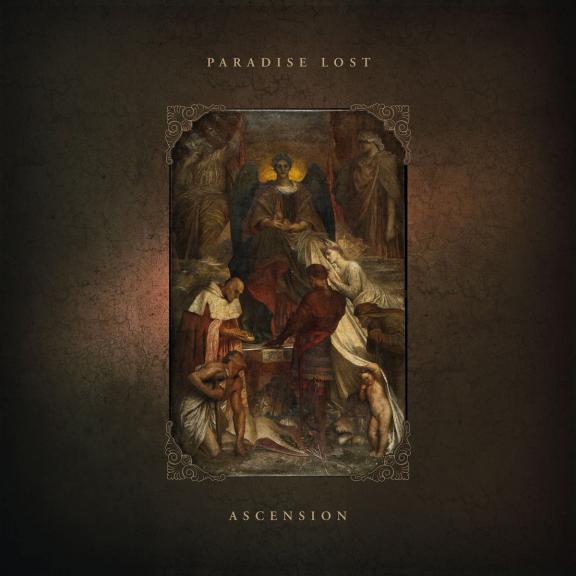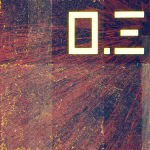Only three days separate the release of Paradise Lost's new album and the start of fall, and it's not unreasonable to see a cause-and-effect relationship between the two, as the overwhelming melancholy of these legends of doom/gothic death metal lends itself particularly well to the gray season. Since the release of Obsidian, their previous album, Nick Holmes and Greg Mackintosh have launched their side project Host, a blend of synthpop and gothic rock, released two live albums, and reissued Icon. Was this a sign of the two masterminds' desires, between a nostalgic look back and more danceable impulses exorcised in another project? Well, perhaps, but not only.
Presented as a new, mournful reflection on power, life, spirituality, change and the passage of time, Ascension is illustrated by George Frederic Watt's The Court of Death to highlight this notion of abandonment and silence in the face of mortality. Paradise Lost is easily recognizable here: they know how to set the mood! There are indeed echoes of Draconian Times and Icon here, with that biting riffing that quickly gives way to a unifying, expansive approach. While Paradise Lost's recent albums each contain their own instant classics (No Hope in Sight, Fall From Grace, etc.), rarely has an album felt so much like a string of potential hits since Symbol of Life. Ascension is Paradise Lost at their best and in blockbuster mood, with that satisfyingly gothic Metallica vibe (Sirens).
The English are masters of their craft and, of course, crush us under the weight of their elegant melancholy from the very first moments of Serpent of the Cross, with Mackintosh's formidable melodies immediately grabbing us by the guts and burying us under cracked marble. It is interesting to note how, with Paradise Lost, the weight of existence is never as overwhelming as during the melodic parts or when Holmes' clear vocals, in all their humanity and gravity, fall like a condemnation. Rich in nuance, powerful, taking its time: Paradise Lost is at the peak of its art.
While many artists talk about death to better highlight life, Paradise Lost seems to evoke life only to bring us back to its ultimate end: death is everywhere. Each track sounds like a funeral march, which the masterful Salvation barely disguises before launching into a section as epic as it is mournful, where, for a few brief moments, you could swear you hear the voice of Primordial's Alan Averill (without any official credit, we'll have to admire Holmes' imitation !). Abandonment, defeat, and mourning, but with a conquering face. We savor this paradox, which is more striking than ever in Paradise Lost: they are unmatched in their ability to make misery and despair galvanizing. It is impossible to resist the power of these songs, which hit home and grab us despite their constant heaviness.
With Tyrants Serenade and Silence Like the Grave, Paradise Lost creates a grandiose funeral monument. We appreciate its vigor, its aggression, its superb theatricality. But it is in the elegance of the nuances and the beauty of the lulls that Ascension takes our breath away: the stripped-down sobriety of the beginning of Lay A Wreath Upon the World, the relentless rain of sadness in Savage Days that dissolves us, or the piano in the aptly named The Precipice that plunges us into the abyss. We hang on Holmes' words, whether the singer delivers them gently or with his abyssal growl, whose impact is all the more devastating after a breath.
Ascension could easily be compared to a kind of best-of compilation of Paradise Lost's work, with electronic temptations (almost) completely left behind, probably for Host (there are still a few ghosts of synths here and there, in This Stark Town for example). This is already what Obsidian was in its own way, after a more extreme interlude at the time of The Plague Within and Medusa. Yet here there is an explosive energy and nervousness, a combativeness in despair that infuses Ascension with a special liveliness. In fact, such a title might seem ironic for a band that spends its time dragging us deeper and deeper under the ground... Yet, with Silence Like the Grave and the conclusion A Life Unknown, which is definitely forward-looking, with its uncertainties but also its hopes, Paradise Lost also picks up the tempo to pull itself out of the grave.
Mackintosh and Holmes' band certainly demonstrates proven expertise, navigating between different periods of its own history and combining them with a consistency and fluidity that commands respect. But it doesn't just settle for “merely” satisfying its fans by offering them a new collection of tracks to mope along to. These funeral orations are like hymns, and Ascension seems to contain an ambition, a desire to explode, to impose its mourning on an ever-growing audience. It's the kind of album you listen to while gradually turning up the volume, immediately timeless, both the pinnacle of a signature style and a new gateway to this fascinating universe. No showing off, just authenticity and a deceptive simplicity with formidable effectiveness that only Paradise Lost's virtuosity and perfect mastery of their subject matter can achieve... Indeed, grief and despondency have rarely been so viscerally enjoyable.





